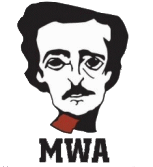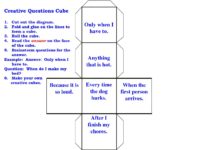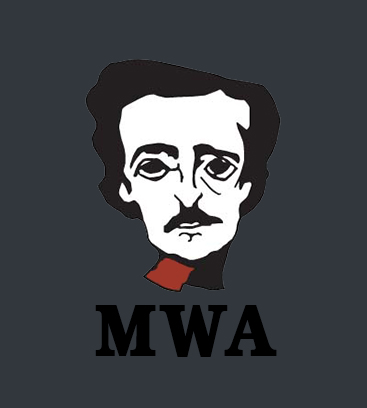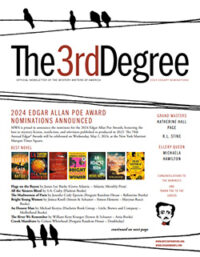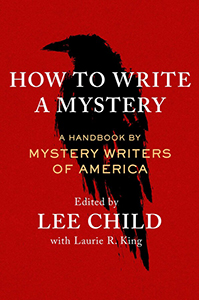Mystery Writers of America is dedicated to promoting higher regard for crime writing and recognition, respect for those who write within the genre, and general literacy. As part of our mission, we’ve created this educator’s page with links to mystery-based reading and writing learning exercises.
Where links are provided, the material has not been created by MWA and is not affiliated with MWA, though the sites were vetted by college-level educators at the time this page was created. All original material below has been created by educators who are also MWA members and is available for use and/or sharing with no restrictions.
Elementary School
- Mystery Writing with Joan Lowery Nixon (Scholastic)
Area: Creative Writing
Age range: Appropriate for grades 4-8
http://teacher.scholastic.com/writewit/mystery/index.htm
Description: Joan Lowery Nixon was a famous children and young adult mystery author and four-time winner of the prestigious Edgar Award. This computer-based lesson begins with an excerpt from a Nixon short story, then describes the elements of a mystery, goes on to offer writing exercises and revision tips, and ends by giving students the opportunity to publish their self-written mystery on the Scholastic website.
- Solving Mysteries! (Scholastic)
Area: Journalism
Age range: Appropriate for grades 3-5
Description (from website): Using the skills involved in solving mysteries, “students will learn about deductive reporting skills and how to reach logical conclusions while strengthening reading skills.”
- Exploring the Mystery Genre (Scholastic)
Area: Reading
Age range: Appropriate for grades 3-5
Description (from the website): “Mysteries are a wonderful vehicle for teaching critical thinking and deductive reasoning skills in an exciting and enjoyable way. This unit is a study of the mystery genre in which students will act as reading detectives. They will discover the elements of a mystery including the typical characters, the common plot structure, and the vocabulary that they will likely encounter in mystery writing. They will work in small detective groups to solve cases and will even write their own mysteries.”
- “Murder,” They Read
Age range: Middle School
http://teachersinstitute.yale.edu/curriculum/units/1989/4/89.04.03.x.html
This genre study is designed for middle school students. It uses The Murder of Roger Ackroyd , The Mousetrap, And Tthen There Were None, and some short stories.
- Everybody Loves a Mystery: A Genre Study
Grade range: 6-8
http://www.readwritethink.org/classroom-resources/lesson-plans/everyone-loves-mystery-genre-796.html
Students examine story elements and vocabulary associated with mystery stories through Directed Learning–Thinking Activities and then track these features as they read mystery books from the school or classroom library. Several activities at the Millennium Mystery Madness website, plus a story map project, add to their understanding and appreciation of the mystery genre. Students plan their own original mystery stories with the help of the interactive Mystery Cube, peer edit and revise their stories, and publish them online.
Millennium Mystery Madness – Award-winning page by Thinkquest Jr.
https://web.archive.org/web/20120629083230/http://library.thinkquest.org/J002344/
Mystery Cube Planning Sheet
http://www.readwritethink.org/files/resources/interactives/cube_creator/media/planning_mystery.pdf
- Sir Arthur Conan Doyle: Lesson plans for the stories of Sherlock Holmes
Area: Various
Grade range: Various
https://www.varsitytutors.com/englishteacher/doyle
Links to online text of many of the Sherlock Holmes novellas and stories, some including student learning activities. Examples:
Sherlock Holmes: Teaching English through Detective Fiction
This unit is designed for 9th grade remedial students.
“A Teacher’s Guide to the Core Classics Edition of Sir Arthur Conan Doyle’s Selected Adventures of Sherlock Holmes”
This document includes study questions, vocabulary practice, literature circle guides, practice with sentence structure and parts of speech, and ideas for projects.
- The Hound of the Baskervilles by Arthur Conan Doyle: Lesson plans and teaching resources.
Area: Various
Age range: Various
https://www.varsitytutors.com/englishteacher/hound-baskervilles-lesson-plans
A variety of resources for studying the novella and film treatments. Example: A three-week unit plan for 9th grade includes standards, essential question, themes, character analysis, project ideas, pictures of the moors, pre-reading and post-reading activities. 31 pages; Adobe Reader required.
- It’s a Mystery to Me
Area: English (literature, expository, and creative writing)
Grade range: 9-12
http://www.yale.edu/ynhti/curriculum/units/1995/1/95.01.07.x.html
Description (from the website): Detective fiction is a genre of writing that provides a wealth of opportunities to incorporate critical thinking strategies and to improve reading skills. The goals of the unit are to introduce more sophisticated adult literature, understand the elements of the genre of detective fiction, apply the scientific method and powers of observation, and practice in writing opinion, expository, and persuasive essays.
The most difficult selection is the first, “The Murders in the Rue Morgue” by Edgar Allan Poe. Since this is the pioneering detective story, it seems the appropriate place to begin. The strategy suggested with this selection is meant to acquaint students with the unique elements of this genre. Here the background information can be integrated with specific instruction to provide a good overview of classic detective fiction. The second selection, “The Red-Headed League” by Sir Arthur Conan Doyle, is much easier to read and understand. Students are required to focus on Sherlock Holmes’s powers of observation, which directly relate to his ability to make predictions about people and events. The final suggested reading is “And Then There Were None” by Agatha Christie. The task for this reading involves higher level thinking skills. Students are asked to develop a persuasive essay based on their interpretation of the appropriateness of the actions of Judge Wargrave.
- Unsolved Mysteries: a WebQuest
Area: English (literature, expository, and creative writing)
Grade range: 9-12
https://www.createwebquest.com/webquest/unsolved-mysteries-webquest
Sherlock Holmes and Dr. Watson often drew different conclusions from the same clues, the same pieces of information. They then looked for additional evidence to prove that something was true.
The process of solving a mystery and the process of creating a presentation have several things in common. Both require gathering and studying clues, evidence, and information; weeding out “red herrings” or irrelevant information; organizing thoughts; and presenting accurate conclusions.
You are a self-employed researcher and presenter. You have been hired by the Unsolved Mysteries Society to conduct background research for an upcoming documentary. It is very important for you to provide accurate information, because the people at the Unsolved Mysteries Society pride themselves on presenting nothing but facts. Your professional reputation (and your future paychecks!) will be affected by the quality of the report you produce for them.
- Agatha Christie: Lesson plans for And Then There Were None
Area: Various
Grade range: 9-12
https://www.varsitytutors.com/englishteacher/christie
A variety of activities to support reading the novel, many focused on different kinds of writing. Includes “casting” the characters, The Murder Mystery Game, persuasive writing. The lessons build skills in critical thinking and making predictions.
- Murder Mystery Game
Area: Literature
Grade range: 9-12
https://www.teacherspayteachers.com/Product/Murder-Mystery-Game-And-Then-There-Were-None-1010051
Description (from the website): “The Murder Mystery Game is the culminating activity after reading Agatha Christie’s And Then There Were None. Students will explain the process of elimination, demonstrate prediction skills, and show evidence of comprehension.” Essentially, the instructor turns the high school into a living “Clue” board. Students go from classroom to classroom and earn clues by correctly answering questions about And Then There Were None. The first group to solve the mystery wins. Although the formatting isn’t great on this website, this activity is a great example of active learning.
- Detective Fiction Course Outline
Age range: 9-12
https://sites.google.com/a/brittonkill.k12.ny.us/mr-parsons-webpage/detective-fiction
Detective Fiction is a half-year English elective that explores the rich history and dynamic nature of this literary genre. In addition to studying the origins of mystery writing, students will read short stories and novels covering the British and American traditions in the genre. The course will focus on the history and development of the detective as an archetypal hero in both traditions. Students will also examine the diverse offerings of modern writers in one of the most popular and widely read literary forms in the world.
- Mystery Syllabi for Middle Grade, High School, & College Levels
http://www.elizabethfoxwell.com/mysterycoursesyllabi.htm
This resource in progress is intended as an aid to those who may be new to teaching mystery and detective fiction or those instructors who wish to compare their approach to that of their colleagues. Many thanks to the instructors and scholars who so generously shared their syllabi. Last updated May 2018 (as of June 2019.)
- “Twenty Rules for Writing a Detective Story” by S.S. Van Dyne (1939)
http://www.thrillingdetective.com/trivia/triv288.html
- The 10 Rules for (Golden Age) Detection Fiction
http://metrowir.com/2013/06/21/the-ten-rules-of-golden-age-detective-fiction/
- Teachers Pay Teachers
Resources developed by teachers for low cost. Use search terms such as these: mystery, crime, mystery writing.
https://www.teacherspayteachers.com/Browse/Search:mystery
https://www.teacherspayteachers.com/Browse/Search:crime
https://www.teacherspayteachers.com/Browse/Search:%22mystery%20writing%22
- YouTube.com
Video resources. Use search terms such as “lessons in mystery.”
- Author Web Sites
Spencer Quinn
Queenie & Arthur books
https://www.peterabrahams.com/queenie-and-arthur/
Chris Grabenstein
Study guide to “Lemoncello” books by Chris Grabenstein
http://chrisgrabenstein.com/wp-content/uploads/2018/11/lemoncello-books-study-guide-11-2018.pdf
If you have other mystery-related lesson plans you would like to share on this site, please contact Mystery Writers of America for consideration by our Education Committee.
